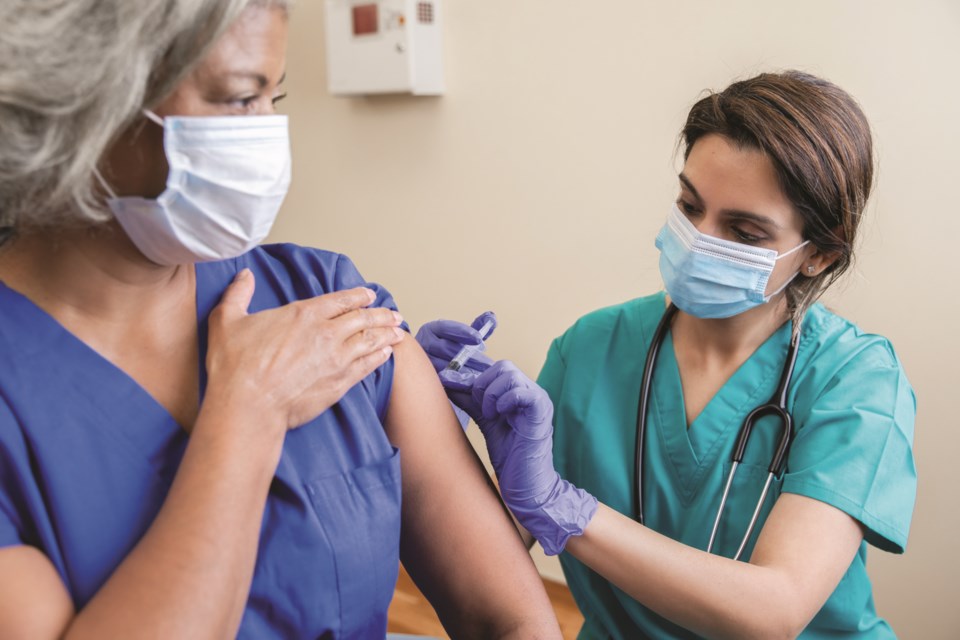Vaccinations for the COVID-19 virus are set to begin in the Sea to Sky for specific groups this month, confirmed Vancouver Coastal Health (VCH).
Seniors aged 80 and up and Indigenous people aged 65 and up are eligible for the vaccine as of March 15 at dedicated COVID clinics in Whistler, Pemberton and Squamish*.
[*An earlier version of this story stated there would be no vaccination clinic in Pemberton, based on an interview with VCH. There will be an immunization site in Pemberton.]
Appointments are open seven days a week, from 9 a.m. to 5 p.m., with evening appointments also available. VCH deputy chief medical health officer Dr. Mark Lysyshyn said walk-ins may also be accommodated, but appointments should be booked in advance where possible.
No vaccination schedule has been set for other age groups, but provincial officials said this week that all adults in B.C. could be offered the first dose by the end of July.
B.C. is now moving into Phase 2 of its immunization plan, with approximately 400,000 people expected for vaccination, before Phase 3 is set to begin in mid-April.
“That will start in April and five-year [age] increments is what’s envisioned, but that may be slightly different in the rural communities where it may not be necessary to go that slowly,” said Lysyshyn of the potential timetable in the Sea to Sky.
There will be two vaccines administered in the region, Lysyshyn said: the Moderna and Pfizer vaccines, both two-dose messenger ribonucleic acid, or mRNA, vaccines, with each dose likely to be separated by about four months—although that timetable can change.
“As time goes on, we can continue to study what happens during those four months,” Lysyshyn said. “It may be that it’s not necessary to give another dose in four months, or maybe it will be worth it at that point because we’ll have more vaccines. It’s really hard to tell.”
As Lysyshyn explained, the mRNA vaccines essentially take genetic instructions from the virus to make a specific protein that then triggers your immune system to produce antibodies before the protein breaks down.
“Now your body recognizes that specific protein so then if you get infected by the COVID virus, it has that protein on it, and your body says, ‘I know that thing’ and basically destroys the virus,” he added. “It’s similar to other vaccines where you introduce the antigen to the body and the body makes an immune response with antibodies … but the difference here is that you’re sort of tricking the body into producing that antigen, which is a bit of a new strategy. It seems to work very well.”
Clinical trials have shown the Moderna vaccine to be 91.4-per-cent effective at preventing the novel coronavirus after two doses, while the Pfizer vaccine was shown to have 95-per-cent efficacy after both doses.
The vaccines take about two weeks to begin working, but even after that period, immunized individuals can still carry the virus.
“That’s why when people are immunized, we need them to continue to follow all the public health recommendations around social distancing and hand-washing and staying home when sick, and if they are identified as a contact in a case, they might also have to isolate because we still don’t know that they can’t be involved in transmission, particularly as we see these new variants come around,” Lysyshyn noted, adding that, similar to the flu, there may need to be new vaccines rolled out in the future to adjust for changes in the virus.
“We really need everyone to keep doing what they’ve been doing after the vaccine, and then we have to see what happens with the cases,” Lysyshyn said. “If the cases really do come down and we’re not seeing any more hospitalizations and we’re not seeing any more outbreaks, and if we manage to achieve enough of that herd immunity, we will be able to relax some of these measures. But we can’t predict that right now because there are new variables turning up every day.”
Although, at press time, the specific locations of the vaccination clinics had yet to be confirmed, Lysyshyn said the sites are likely to be set up at existing community facilities.
VCH continues to recruit its immunization workforce, Lysyshyn said, which has so far typically been made up of working or retired nurses, pharmacists and doctors.
Those eligible to book a vaccine appointment can do so by calling 1-877-587-5767, starting March 8. The line will be open daily between 7 a.m. and 7 p.m.
For questions about the vaccine, call 1-888-268-4319 or visit gov.bc.ca/covid19. For information on vaccination clinics, visit vch.ca.



